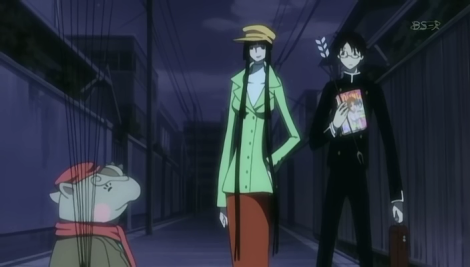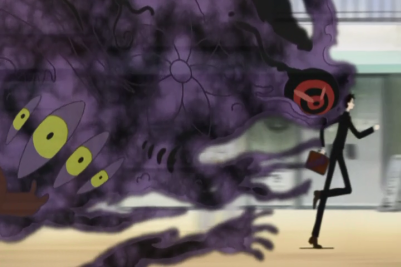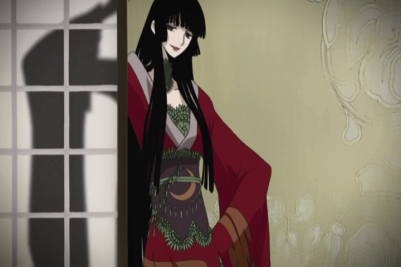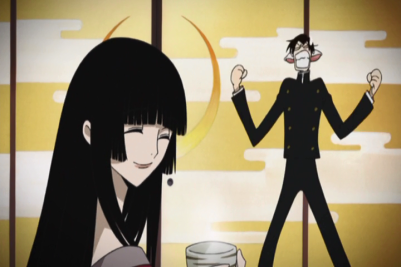Japanese Title: Onegai Teacher
Related: Please Twins! (Same setting)
Similar: Midori Days
Waiting in the Summer
To-LOVE-Ru
Watched in: Japanese & English
Length: 12 episodes & 1 OVA
Positives:
- Several genuinely funny moments.
- The teacher is a fun character with her kind heart, ditziness, and jealousy.
- ‘Tsutaetai Koto ga Arunda’ is a gorgeous piano track.
- Looks surprisingly polished considering the low budget narrative.
Negatives:
- Suffers from several anime romantic comedy clichés, especially the ‘interrupted kiss’ a dozen times.
- The most contrived twist occurs in the final third to force “meaningful” drama before the conclusion.
- The teacher’s family is irritating, her sister in particular, for the few episodes they are in.
I really wanted to like Please Teacher more than I do. It could have either been a great piece of socially commentary or death-by-laughter hilarious and charming – or both. Unfortunately, it didn’t even come within the horizon of what I wished. And no, it isn’t because of the student-teacher relationship premise; that premise is Please Teacher’s most interesting aspect. In the real world, a student-teacher relationship isn’t alright because it’s a breach of trust and abuse of power (even if of consenting age, as in the case of Please Teacher). In the real world, there also isn’t a disease that comatoses people at random, halting the ageing process while unconscious. However, in fiction, you are free to explore ‘what if.’
What if your teacher was an alien? What if you have to pretend to be in a relationship with her to cover up the fact that she is an alien from your family? Then what if you have to marry her to cover up the fact that you are in an illicit relationship with your teacher from the principal, saving her job, which is a cover up for the fact that she is an alien? (Breathe!) It’s an interesting scenario, and the one of Please Teacher.
Kei is a fifteen-year-old (in appearance) high school student who witnesses the teleportation of a beautiful alien woman with pink hair to his town’s lake. I say in appearance because he is eighteen, but suffers from an affliction that causes blackouts referred to as ‘stand stills,’ one lasting three years, throughout which he didn’t age a day. The morning after the alien arrival, he is shocked to see that she is his new schoolteacher, Ms Kazami. Furthermore, she moves in next door to him. After a series of mishaps involving her TARDIS-like alien complex, resulting in a compromising situation between the two, Kei lies to his uncle about them being in a relationship with her. Kei’s uncle goes along with it (he has the hots for the voluptuous teacher despite his wife standing over his shoulder), and is the funniest character in the series.
Matters escalate further, when the school principal finds Kei and Ms Kazami locked in the sports equipment room. The uncle comes up with the genius idea that they are married, saving her job and his place in school (true age revealed to address the legality). She is a charming character.
Much of the humour comes from them hiding the relationship, especially from Kei’s school friends, and his awkward inexperience with women. Make no mistake; there are plenty of risqué moments and clever sexual innuendos, but nothing explicit. Though Please Teacher isn’t gasping-for-air hilarious, it still has a good number of gags, most of which are in the first half and the OVA (the funniest episode). Past the halfway mark, the humour declines to make room for “drama.”
This drama is utter rubbish. There is the most contrived twist with Kei in the final third attempting to bring depth the narrative. To call it a twist is generous. I won’t spoil it, but if it were spoiled, you would be dumbfounded by its stupidity. One would think that the greatest opportunity for drama in a student-teacher relationship is the illicit nature or at least the age difference. Nope, nothing to do with the relationship at all. Pathetic. I am all for drama, but this… And it came at the expense of all humour. At least the funny OVA that follows afterwards set the record straight.
In the end, Please Teacher is an enjoyable show outside of the final third’s swan dive into arse gravy. The dynamic between Kei and Ms Kazami is fun to watch as they hide their relationship. Recommended for an easy viewing experience.
Art – High
Sports surprisingly polished art and character design considering the easy-money narrative. Doesn’t feel cheap.
Sound – Medium
Good voice work in both languages and one particularly great piano piece. The rest of the music is bland.
Story – Medium
A pleasant and fun story about a boy forced to marry his teacher…until the final third that decapitates the humour for terrible drama.
Overall Quality – Medium
Recommendation: Try it. If you want something fun to watch with an interesting premise and a good amount of polish, then Please Teacher is for you. Also, you must be able to look past the student-teacher relationship.
(Request reviews here. Find out more about the rating system here.)
Awards: (hover mouse over each award to see descriptions)
Positive: None.
Negative:

































